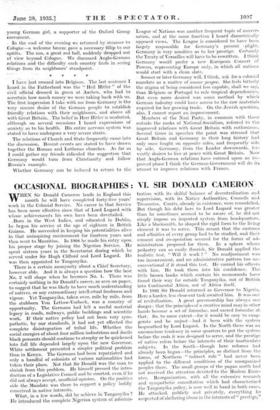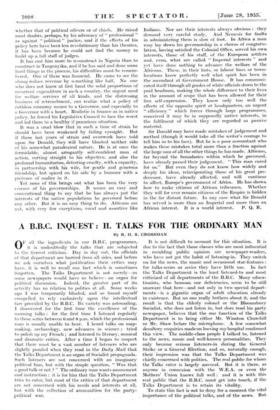OCCASIONAL BIOGRAPHIES : SIR DONALD CAMERON
WHEN Sir Donald Cameron lands in England this month he will have completed forty-five years' work in the Colonial Service. No career in that Service has been more effective since that of Lord Lugard . with whose achievements his own have been dovetailed. .,?Born in the West Indies, and educated in Dublin, he • began his service at the age of . eighteen in British Guiana. He succeeded in keeping his potentialities alive in that uninspiring environment for fourteen years and then went to Mauritius. In 1908 he made his entry upon his proper stage by joining the Nigerian Service. He spent sixteen years in the Secretariat during which he served under Sir Hugh Clifford and Lord Lugard. He was then appointed to Tanganyika.
There is a certain anonymity about a Chief Secretary, however able. And it is always a question how the best No. 2 will shape when he becomes No. 1. There was certainly nothing in Sir Donald's career, as seen on paper, to suggest that he was likely to have much understanding of natives, or any extraordinary intellectual freshness and vigour. Yet Tanganyika, taken over, mile by mile, from the stubborn Von Lettow-Vorbeck, was a country of opportunity. The Germans had left a useful material legacy in roads, railways, public buildings and scientific work. If their native policy had not been very sym- pathetic, by our standards, it had not yet effected the complete disintegration of tribal life. Whether the social energies of about four million industrious and docile black peasants should continue to atrophy or be quickened into full life depended largely upon the new Governor. White settlement presented a simpler political problem than in Kenya. The Germans had been repatriated and only a handful of colonists of various nationalities had taken their place. Not that Sir Donald was the man to shrink from this prOblem. He himself pressed the intro- duction of a Legislative Council and he courted, even if he did not always accept, unofficial opinion. On the positive side the Mandate was there to support a policy boldly conceived in native interests.
What, in a few words, did he achieve in Tanganyika ? He introduced the complete Nigerian system, of adminis- tration with its skilful balance of decentralization aid supervision, with its Native Authorities, Councils and Treasuries. Courts, already in existence, were remodelled. But though his debt here to Lord Lugard was greater than he sometimes seemed to be aware of, he did not simply impose an imported system from headquarters. Like a blacksmith, he shaped the rigid form to the living element it was to serve. This meant that the customs and affinities of every group had to be studied, and their consent and co-operation secured for the forms of ad- ministration proposed for them. In a sphere where pedantry can so easily flourish, Sir Donald applied the realistic test, " Will it work ? " No readjustment was too inconvenient, and no administrative pattern too un- conventional if it stood this test. He carried his officers with him. He took them into his confidence. The little brown books which contain his memoranda have found their way far outside Tanganyika, out of British into Continental Africa, out of Africa itself.
In 1931 Sir Donald returned as Governor to Nigeria. Here a harder, less clear-cut task awaited him. It was one of revitalization. A great governorship has always one danger: that the principles of a creative mind may in other hands become a set of formulae, and sacred formulae at that. So, to some extent—for it would be easy to exag- gerate and be unjust—had it been with the system bequeathed by Lord Lugard. In the North there was an unconscious tendency in some quarters to put the system before the ends it was designed to serve, and the prestige of native rulers before the interests of their inarticulate subjects. In the South—though here reforms had already been begun—the principles, as distinct from the forms, of Northern " indirect rule " had never been applied to the different conditions of the unorganized peoples there. The small groups of the pagan north had not received the attention devoted to the Moslem Emir- ates. Reorganization, with all the extensive research and sympathetic consultation which had characterized the Tanganyika policy, is now well in hand in both cases. He attacked, publicly and privately, everything he suspected of sheltering abuse in the interests of " prestige,".. whether that of political officers or of chiefs. He raised most doubts, perhaps, by his advocacy of " professional " as against " political " justice, and if the effects- of his policy here have been less revolutionary than his theories, it has been because he could not fmd the money to build up a full staff of judges.
It has cost him more to reconstruct in Nigeria than to construct in Tanganyika, and if he has said and done some hard things in the process, his difficulties must. be remein. bered. One of these was financiaL He came to see the slump reduce revenue by something like half. No one who does not know at first hand the solid proportions of recurrent expenditure in such a country, the urgent need for welfare services of all kinds, and the distressing business of retrenchment, can realize what a policy of ruthless economy means to a Governor, and especially to a Governor with a heart. Realistic in finance as in native policy, he forced his Legislative Council to face the worst and led them to a healthy if penurious situation.
It was a cruel blow that in such a time of strain. he should have been weakened by failing eyesight.. But if these last years of strain and overwork have told upon Sir Donald, they will have blunted. neither side of his somewhat paradoxical nature. He is at once the formidable, almost arrogantly self-confident man of action, cutting straight to his objective, and also the profound humanitarian, detesting cruelty, with a capacity,. in. partnership with his wife, for gentle and generous, friendship, but spiced on his side by a humour with a pretence of malice in it.
Yet none of this brings out what has been the very essence of his governorships.. It seems an easy and conventional thing to say that he has always put the interests of the native populations he governed before any other. But it is no. easy thing to- do. Africans are not, with very few exceptions, vocal and assertive like Indians.. Nor are their. interests always obvious : they demand very careful study. And Nemesis fore faults in administering them is slow of foot. In Africa a man may lay down his governorship in a chorus of congratu- lation, having satisfied the Colonial Office, served his own interests, those of his staff, of the European settlers and, even, what are called " Imperial. interests " and yet have done nothing to advance the welfare of the Africans. These, in their huts, or labour lines or town- locations know perfectly well what spirit has been in the ascendant at Government House. It has communi- cated itself through all grades of white officials down to the paid headman, making the whole difference to their lives in the amount of scope that has been allowed for their free self-expression. They know only too well the effects of the opposite spirit at headquarters, an urgent " efficiency " which forces through large programmes, conceived it may be in supposedly native interests, in the fulfilment of which they are regarded as passive material.
Sir Donald may have made mistakes of judgement and method (though it would. take all the writer's courage to tell him so to his face). But be is a poor accountant who. makes these mistakes total more than a fraction against the large sum of all the other things he has made: Africans, far beyond the boundaries within• which he governed, have already passed their judgement. " This man cared for us." But even they do not know how widely and deeply his ideas, reinvigorating those of his great pre- decessor, have already affected, and will continue to affect, Europe's government of Africa. He has shown how to make citizens of African tribesmen. Whether they will for ever remain- citizens of the Empire is hidden in the far distant future. In any case what Sir Donald has served is more than an Imperial and more than an African interest. It is a world interest. P. Q.. R.







































 Previous page
Previous page